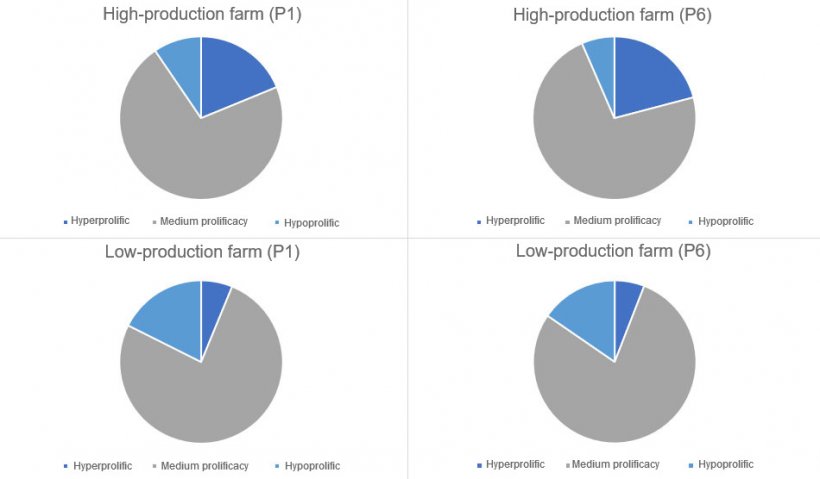One of the questions that make the farmers doubt more nowadays is if it is worth to purchase hyperprolific sows for their farms. In many cases, the financial reasons are the ones that tip the balance in one way or the other, but maybe the answer lays on our own farm.
A recent study entitled “High-performing farms exploit reproductive potential of high and low prolific sows better than low-performing farms” seems to have the answer.

The team, consisting of Satomi Tani, Carlos Piñeiro and Yuzo Koketsu, has carried out a study to define the relationship between the potential of hyperprolific sows and the type of farm on which they are housed. To this aim they collected data from 98 Spanish farms, analysing 491,290 matings throughout the productive life of 85,096 sows between 2008 and 2013.
The data have been classified according to the sows' productivity and the type of farm, so that:
The sows are classified in 3 groups according to their first parity results:
- High prolificacy or hyperprolific sows are those sows included in the top 10% of the animals studied, with an average equal or higher than 15 born alive (BA) piglets
- Medium prolificacy sows, with 8-14 BA piglets
- Low prolificacy of hypoprolific sows, with an average equal or lower than 7 born alive (BA) piglets
Whereas the farms are classified in 3 groups depending on their production level:
- High-performing farms: those exceeding 24.7 pigs weaned/sow/year
- Medium performance farms: 24.7-21.2 pigs weaned /sow/year
- Low-performing farms: less than 21.2 pigs weaned/sow/year
The first result obtained makes reference to the distribution of the hyper- and hypoprolific sows. Regardless of the parity, the distribution of sow type remains almost constant within each kind of farm (Figure 1).

Figure 1. Distribution of the kind of sows, in parity 1 and 6 categorised by the kind of farms considered
On the other hand, if we compare the behaviour of the previously classified sows according to the type of farm where they are housed, we see this (Table 2):
Table 2. Classification of the results relative to BA piglets, categorized by parity, and kind of sow and farm.
| P1 | P2 | P3 | P4 | P5 | P6 | ||
|---|---|---|---|---|---|---|---|
| Hyperprolífic sows | High-performing farm | 15.8 | 13.1 | 13.7 | 13.8 | 13.6 | 13.3 |
| Low-performing farm | 15.6 | 12.3 | 12.7 | 12.8 | 12.5 | 12.3 | |
| Hypoprolific sows | High-performing farm | 5.0 | 11.8 | 12.5 | 12.8 | 12.9 | 12.7 |
| Low-performing farm | 5.1 | 10.3 | 11.1 | 11.1 | 11.2 | 11.3 |
Initially, the hyperprolific sows behaved similarly in their first farrowing, regardless of the fact of being housed on high- or low-performing farms. Despite this, in multiparous sows there is a greater difference in productive behaviour depending on the type of farm. Specifically, from the 2nd to the 6th parturition, the hyperprolific sows housed on high-performing farms have 0.8-1.1 more BA piglets than the same kind of sows housed on low-performing farms.
Regarding the behaviour of multiparous and hypoprolific sows, differences are also seen depending on the kind of farm. This is, hypoprolific multiparous sows housed on high-performing farms produce 1.4-1.7 BA piglets more than the same type of sows housed on low-performing farms.
Generally speaking, hyper- and hypoprolific multiparous sows, housed on high-performing farms showed better results in terms of BA piglets than the ones housed on low-performing farms.
Regarding performance at weaning, in all the parities, the sows housed on high-performing farms wean more piglets that those housed on low-performing farms (Table 3).
Table 3. Classification of the results relative to weaned piglets, categorised by parity, and kind of sow and farm.

| P1 | P2 | P3 | P4 | P5 | P6 | ||
|---|---|---|---|---|---|---|---|
| Hyperprolific sows | High-performing farm | 11.2 | 11.3 | 11.2 | 11.1 | 10.9 | 10.9 |
| Low-performing farm | 10.2 | 9.9 | 9.9 | 9.8 | 9.8 | 9.3 | |
| Hypoprolific sows | High-performing farm | 10.4 | 11.1 | 11.1 | 11.2 | 11.1 | 11.0 |
| Low-performing farm | 8.1 | 9.7 | 9,.7 | 9.8 | 9.7 | 9.5 |



